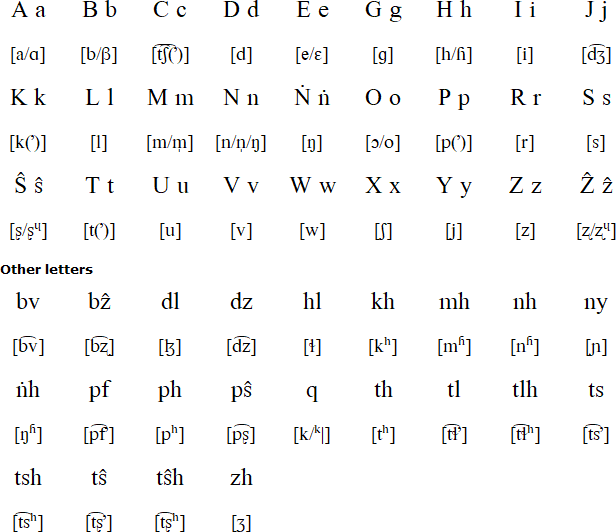Tswa is Southern Bantu language spoken by about 1.2 million people mainly in Mozambique. It is spoken particulary in rural areas in the west of Inhambane Province in southern Mozambique. There are also some speakers of Tswa in southern Zimbabwe and in South Africa.
Tswa is also known as Tshwa or Xitswa. The people who speak it call their language xiTswa and themselves baTswa. Dialects include Hlengwe, Mhandla, Nwanat, Dzibi and Dzonga. Tswa is closely related to Ronga and Tsonga. Many people in Mozambique see Tswa as a dialect of Tsonga.
Tswa is written with a version of the Latin alphabet based on the Tsonga orthography, which was developed by Portuguese colonists and Methodist missionaries. The Tswa version was consolidated by Rev. J. A. Persson of the Methodist Episcopal Mission in Portuguese East Africa, whose An English-Tswa Dictionary was published in 1928. There is also a grammar of Tswa, and a translation of the Bible.

Download Tswa alphabet chart (Excel)
Details of the Tswa alphabet provided by Wolfram Siegel (PDF)
Tingi a wa tsama ni kokwani wakwe. Yena a wa hlayisa a ti homu zinʼwi na kokwani. A siku gu kari, ku tili a va ka maxanga. Vona va tekili a ti homu va famba. Tingi zinʼwi ni kokwani wakwe va tsutsumili va ya fihlala. Vona va fihlalile lomu khwatini kala gi phuma. A nzaku ka lezvo, a va ka maxanga va wuyili kambi. Tingi a fihliwilwe lomu ka matluka hi kokwani wakwe. A munʼwi wa va ka maxanga a kanzihelili tingi, kanilezvi yena anga ketangi. A kama wo ngana na ku rulili, tingi ni kokwani wakwe va humili laha ku basa. Vona va xiyamelili va ya kaya.
Tingi lived with his grandmother. He used to look after the cows with her. One day the soldiers came. They took the cows away. Tingi and his grandmother ran away and hid. They hid in the bush until night. Then the soldiers came back. Grandmother hid Tingi under the leaves. One of the soldiers put his foot right on him, but he kept quiet. When it was safe, Tingi and his grandmother came out. They crept home very quietly.
Source: https://storybooksafricanlanguages.net/stories/tsc/0210/
Information about the Tswa language
http://en.wikipedia.org/wiki/Tswa_language
https://pt.wikipedia.org/wiki/L%C3%ADngua_x%C3%ADtsua
https://www.hopehealafrica.org/xitswa-dictionary
Aka, Bafaw-Balong, Bangi, Bangubangu, Basaa, Bemba, Bembe, Bena, Benga, Bhaca, Bila, Bube, Budu, Bujeba, Bukusu, Bulu, Bushong, Central Kilimanjaro, Central Teke, Chichewa, Chokwe, Chuwabu, Comorian, Dciriku, Digo, Duala, Eton, Ewondo, Fang, Fuliiru, Ganda/Luganda, Gogo, Gusii, Gwere, Gyele, Haya, Hehe, Herero, Ibinda, Idaxo-Isuxa-Tiriki, Ikizu, Ikoma, Jita, Kabwa, Kako, Kamba, Kanyok, Kiga, Kikuyu, Kimbundu, Kinyarwanda, Kirundi, Kisi, Kobo, Kogo, Komo, Kongo, Konjo, Koti, Kukuya, Kunda, Kuria, Kwambi, Kwasio, Lambya, Lengola, Lingala, Loma, Lozi, Luba-Katanga, Luchazi, Lunda, Luvale, Luyana, Makaa, Makonde, Makhuwa, Mandekan, Maore, Masaaba, Mbama, Mbere, Mbosi, Mbukushu, Mbunda, Mbuun, Mende, Mongo, Mpiemo, Mushungulu, Mwani, Myene, Nambya, Nande, Ngoni, Ngwii, Njebi, Nkore, North Teke, Northern Ndebele (South Africa), Northern Ndebele (Zimbabwe), Northern Sotho, Nyamwezi, Nyakyusa, Nyemba, Nyole, Nyoro, Nyungwe, Nzadi, Oroko, OshiWambo, Pagibete, Punu, Ronga, Safwa, Seki, Sena, Sengele, Shona, Soga, Songe, Southern Ndebele, Southern Sotho, Sukuma, Swahili, Swati, Talinga, Tanga, Tembo, Tetela, Tonga, Tooro, Tshiluba, Tsonga, Tswa, Tswana, Tumbuka, Umbundu, Venda, Vili, Vwanji, Xhosa, Yakam, Yansi, Yao, Yasa, Yeyi, Zigula, Zinza, Zulu
Languages written with the Latin alphabet
Page last modified: 01.06.25
[top]
You can support this site by Buying Me A Coffee, and if you like what you see on this page, you can use the buttons below to share it with people you know.

If you like this site and find it useful, you can support it by making a donation via PayPal or Patreon, or by contributing in other ways. Omniglot is how I make my living.
Note: all links on this site to Amazon.com, Amazon.co.uk
and Amazon.fr
are affiliate links. This means I earn a commission if you click on any of them and buy something. So by clicking on these links you can help to support this site.
[top]